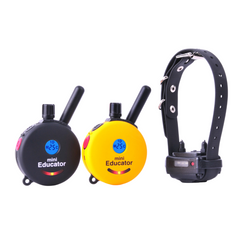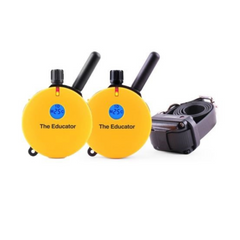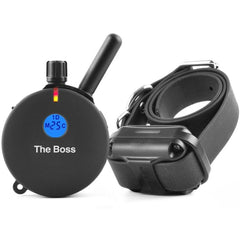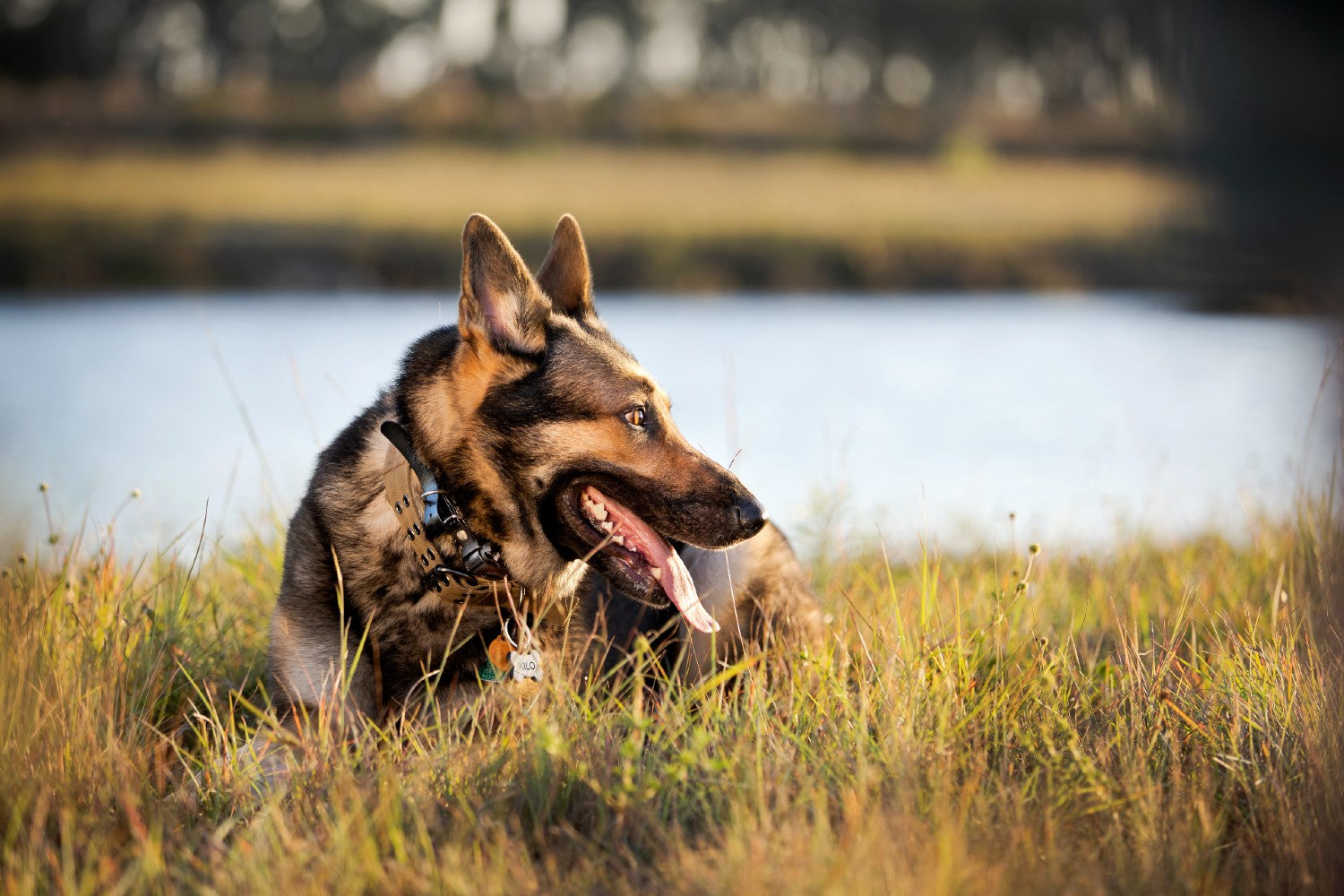Ways to Avoid Sores and Burns on Your Dog's Neck from Electric Dog Collars

This article was updated on September 5, 2024.
The use of electric dog collars for training is a topic that has people barking up the wrong tree. Some argue that the electric stimulation from shock collars can hurt your dog's neck. However, the static shock emitted by an e collar is not strong enough to produce burns, even at its highest setting.
What some people mistake for burns are actually pressure sores caused by the collar's prongs, not the electrical stimulation.
In this blog post, we’ll provide practical tips to help you prevent sores and burns on your dog’s neck for a comfortable training experience.
What Are Pressure Sores?
Pressure sores, also known as pressure necrosis, are caused by prolonged pressure on the skin. They can appear as redness, swelling, and tenderness in the affected area.

Can an E-Collar Cause Sores?
While e-collars can be effective training tools, it's important to use them responsibly to prevent skin irritation. One common concern is the development of pressure sores, which can occur due to prolonged contact between the collar's prongs and the dog's skin.

How Do E-Collar Pressure Sores Happen?
E-collar sores result from the prolonged pressure from the collar’s contact points. When the collar is too tight, these points can dig into the skin, creating friction that leads to irritation, redness, and, eventually, sores.
Similar to bedsores in humans, e-collar pressure sores can develop if the collar is worn for extended periods. It's important to note that these sores can occur regardless of whether a static shock is applied. The underlying issue is the constant pressure from the contact points, not the stimulation itself. In fact, even a regular collar can cause pressure sores if it's too tight and worn for prolonged periods.

Ways to Avoid Pressure Sores from Electric Dog Collars
To prevent pressure sores from electric dog collars, consider these tips:
1. Fit the electric dog collar properly.
A collar that is too tight can restrict blood flow, which can cause the skin tissue to break down. This can lead to pressure necrosis, even if the collar is not delivering static stimulation.
On the other hand, if the collar that is too loose, the contact points can rub repeatedly on your dog’s skin. This constant rubbing causes friction, which can eventually lead to sores.
Hence, the collar should be snug enough to stay in place, but not so tight that it can’t move at all. To find the right fit, check your manual and follow the instructions carefully.

2. Rotate the dog collar every 1 to 2 hours.
Rotating the collar helps prevent the contact points from rubbing on the same spot on your dog's neck. This can help reduce the risk of sores and skin irritation. You can reposition the collar every 1 to 2 hours.
To rotate the collar, loosen the buckle, and slide the collar to a different position.

3. Avoid leaving a dog shock collar on your dog for too long.
The maximum amount of time that a dog should wear an electric collar is 10 hours per day. The collar’s contact points can irritate the dog’s skin if left in contact for too long.
If you need to use the collar for more extended periods, take breaks to give your dog’s neck a rest. For example, you could take the collar off for an hour or two after walking or playing fetch.

4. Do not attach a leash to the e-collar.
Attaching a lead to an e-collar can put extra pressure on the contact points, increasing the risk of sores. If your dog pulls on the leash, the contact points can dig into their skin, causing more discomfort.
If you need a leash, it is best to use a separate collar. Alternatively, you can attach the lead to a harness.

5. Check your dog for any allergic reactions.
Some dogs may be allergic to the metal used in prongs, such as nickel. This can cause a reaction on the dog’s skin, such as redness, swelling, or itching. If you notice these signs, you should remove the collar and contact your veterinarian.
To minimize the risk of skin reactions, consider using surgical-grade stainless steel contact points. Known for their superior corrosion resistance and biocompatibility, surgical-grade stainless steel is often used in medical applications. This reduces the likelihood of allergic reactions, making it a safe choice for dogs.
- PetsTEK 3/4" & 1" Surgical-Grade Stainless Steel Contacts for Dogtra E-Collars
- PetsTEK 3/4" & 1" Surgical-Grade Stainless Steel Contacts for E-Collar Technologies Dog Collars
For dogs with sensitive skin, there are also hypo-allergenic titanium and plastic prongs available.
6. Clean the dog training collar and your dog's neck regularly.
Dirt and debris can build up on the collar and your dog’s neck, causing skin irritation. To prevent this, clean the collar and your dog’s neck with mild soap and water after wet activities. You can also use a pet-safe disinfectant to help kill any bacteria or viruses that may be present.

7. Avoid using low-quality electric dog collars.
Do not buy cheap electronic collars from unverified sources. They may not have been tested for safety and quality standards, posing a risk to your dog's health.
To ensure your dog's safety and comfort, always purchase a collar from a reputable manufacturer, such as E-Collar Technologies, Dogtra, PetSafe, and SportDog. These manufacturers have a long history of producing high-quality collars that are safe and effective.




PetsTEK’s Picks for Best Shock Collars for Dogs
Speaking of high-quality e collars, PetsTEK has a few recommendations to help you out:
1. Mini Educator ET-300 Remote Training Collar by E-Collar Technologies

The Mini Educator ET-300 is popular among dog owners and trainers. This Educator collar comes with three color options: yellow, black, and Educator Zen 300. It has 100 levels of static stimulation, Pavlovian tone, and vibration. It also offers a custom boost with up to 60 levels.
2. Mini Educator ET-300 2T Remote Dog Training Collar with 2 Transmitters by E-Collar Technologies

The ET-300 Mini Educator 2T (2 Transmitters) e collar packs all the beloved features of the popular Mini Educator, plus one game-changer: two (2) transmitters! With 2 remotes on the same frequency, this advanced dog training collar is perfect for collaborative training sessions or larger homes. Keep a remote in the living room and one in the backyard, and no corner will be beyond your reach.
If you're handling 2 dogs, this 2T Educator collar also comes in a 2-dog unit, featuring two remotes and two receiver collars.
3. Educator ET-400 2T Remote Dog Training Collar Yellow by E-Collar Technologies

The Educator ET-400 2T e collar is a 1-dog Educator system equipped with 2 transmitters on the same frequency. If you want a unit that carries all the features of the Mini Educator but with a longer range, this model fits the bill. This Educator e collar is great for 2 people training a dog or larger houses where an extra remote could come in handy.
Have a pair of pups? Opt for the 2-dog system of this Educator dog collar, complete with two remotes and two receiver collars.
4. Boss Educator ET-800 Remote Dog Training Collar by E-Collar Technologies

The Boss Educator ET-800 is a remote dog training collar perfect for large, stubborn dogs. It has a 1-mile range, Pavlovian tone, and non-stimulating vibration. This e-collar is also expandable, allowing you to train two dogs simultaneously.
5. Dogtra 1900S Remote Training Collar

The Dogtra 1900S is a versatile remote collar for medium and large-sized dogs. This Dogtra collar for dogs is ideal for various activities, including pet obedience, hunting, competitions, and K9 work. It has a range of ¾ mile, 127 levels of stimulation, and a high-performance pager vibration.
How to Treat Shock Collar Sores?
Pressure sores can be painful and uncomfortable for your pet. That’s why it’s important to regularly check your dog’s neck for rash, soreness, or irritation.
If your dog develops shock collar sores, treat them promptly. Here are some tips on how to do this:
1. Remove the e-collar.
The first step is to remove the shock collar from your dog's neck. This will allow the sores to heal and prevent any further irritation.
2. Clean the affected area.
Once you have removed the collar, clean the area around the sores with warm water and mild soap. Be gentle when cleaning the area to avoid causing any further harm.
3. Apply an antibacterial ointment.
After cleaning the sores, apply a small amount of antibacterial ointment to the affected area. Look for a product with ingredients like aloe vera, as this can help soothe the skin. Avoid any creams containing hydrocortisone, since this component can slow the healing process.
4. Monitor the sores.
Keep an eye on the sores and monitor them for any signs of infection. If the sores persist for over a few days, consult your veterinarian.
5. See the vet.
If the wound does not improve, you should take your dog to the vet as soon as possible. The vet can prescribe pain medication and antibiotics for proper management of pressure necrosis.
Conclusion
While e-collars do not cause burns, they can cause pressure sores if the collar is not used properly. These sores can be painful and uncomfortable for your pet. So, it is crucial to take action immediately if you notice any signs of a pressure sore.
To help prevent sores from occurring, make sure to follow the ways we’ve discussed above.
You might also enjoy...
-
Posted in
Dog Training, Pet Health, Remote Training Collar







